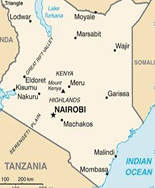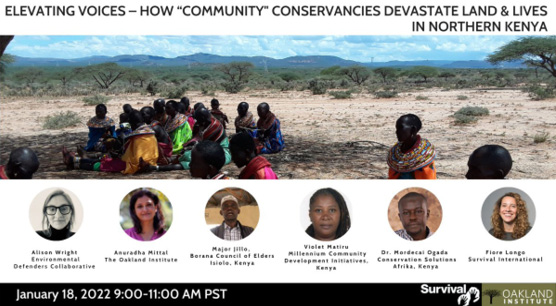(GIN)—Nature conservancies, with the stated goal of protecting wilderness and endangered wildlife, have enabled the removal of tribal peoples from their ancestral homelands in Africa to allow superior “western” models of conservation to prevail, according to the activist group Survival International.
Under the western model, half of all land must be kept in a natural state to protect Earth, as the National Geographic Society recently declared on its magazine pages, if a stable climate and high quality of life are to be preserved in the near future.
Survival International, a policy think tank, has dubbed this “fortress conservation” whereby Indigenous peoples and other local populations are evicted from their lands to create a park that aims to “preserve nature.” Often, these parks are then accessible to tourists who can afford to pay for a luxurious safari, while the local population who depends on the land for survival is prohibited from entering their ancestral land. To address these evictions, Survival International, has launched a campaign to “decolonize conservation.”

Survival International was one of the guest speakers at a recent webinar hosted by the California-based Oakland Institute titled “Elevating Voices—How Community Conservancies Devastate Land & Lives in Northern Kenya.”
Evictions are taking place, they asserted, where governments and charities fence off vast areas of land claiming this is necessary for conservation.
“Stolen lands are called a “Protected Area” or “National Park” and keep out the original inhabitants, sometimes using a shocking level of violence,” a spokesperson for Survival International said.
“This is colonialism pure and simple: powerful global interests are shamelessly taking land and resources from vulnerable people while claiming they are doing it for the good of humanity,” Survival International declared.
Violet Matiru, a zoologist, researcher and executive director of MCDI, a Kenyan organization that promotes environmental solutions to natural resource challenges, addressed this issue at the Oakland Institute event.
“Foreign donors have a vested interest in accessing our resources for their own citizens. They are not angels brought from above to come and help us. We need to understand this so we can push back.”
“Some 50 million acres in Africa are already controlled by these conservancies and water is their next target. They are working with Coca Cola to privatize our water resources,” she maintained.
Colonial conservation, also known as Fortress Conservation, according to speakers at the webinar, rests on the racist misconception that indigenous people cannot be trusted to look after their own land and the animals that live there. Its proponents view the original custodians of the land as a “nuisance” to be “dealt with,” instead of as experts in local biodiversity and key partners in conservation.
An opposing view was defended by the Northern Rangelands Trust (NRT), a local membership organization in northern and coastal Kenya that says it is building peace and improving livelihoods through conservation. Formed with support from USAID, NRT brings together local pastoralist landowners and the government of Kenya to promote the long-term conservation of wildlife in Kenya’s northern rangelands and coastal region.
Meanwhile, Mordecai Ogada, director of Conservation Solutions Afrika and co-author with journalist John Mbaria of the book “The Big Conservation Lie,” spoke of the problems in Africa that stem from a racialized system that favors Western foreigners over Black Africans.
“Evidence proves Indigenous people understand and manage their environment better than anyone else,” asserts Survival International. “Eighty percent of Earth’s biodiversity is in tribal territories and when indigenous peoples have secure rights over their land, they achieve at least equal if not better conservation results at a fraction of the cost of conventional conservation programs.”













